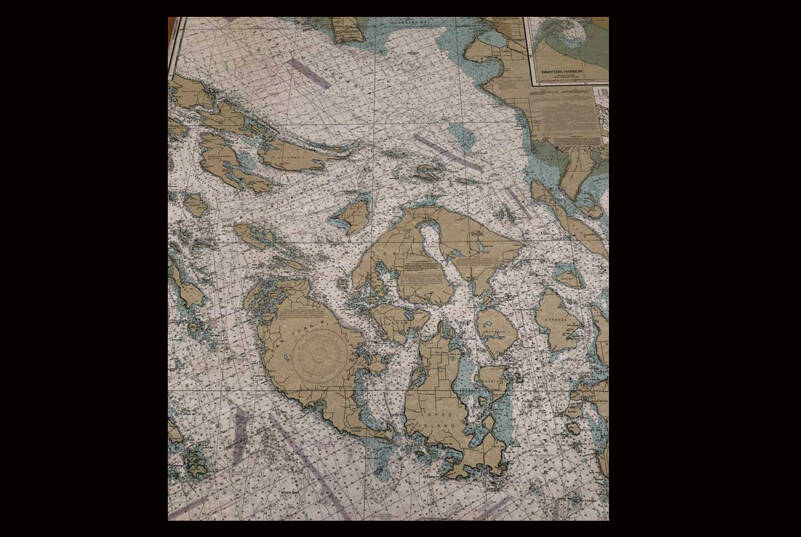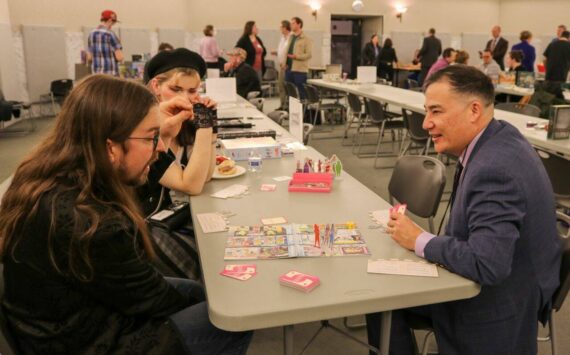By Morf Morford, Tacoma Daily Index
Essential and not-so-essential skills
For virtually all of human history individuals and cultures have been known by, and defined by, their skills and habits.
Acquiring skills and habits is, in many ways, unintentional. We absorb skills and habits to a large degree, from those around us — like those basic ways of interacting with others, from punctuality to one’s work ethic to routine aspects of hygiene, like brushing one’s teeth.
Over time, both in our individual life span and in the culture at large, there are some sets of skills that retain their meaning and purpose and some that do not.
One of those skills along the spectrum of essential/nonessential skills is map-reading. Yes, I mean the old-school paper, impossible to fold-up-correctly sprawling, multi-colored map.
I’ll have to admit here that I am of a generation of Boy Scouts, travellers and road-trippers that used and appreciated (and sometimes made our own) maps. We also had more than our share of real or manufactured treasure maps.
But no matter the purpose or destination or even reality of maps, they all had a couple things in common – they gave us perspective, they showed us where we were and where we were going – or could go.
The glowing blue blip of the GPS shows us where are but without the context, without the sense and guidance, of what we do to achieve our destination.
I would say that not many young people know what they are missing. In a recent survey only 20% of millennials wished they were better at reading maps.
They probably should be though, because 60% of millennial respondents say they are reliant on digital maps when going somewhere new and a quarter are very reliant even in their day-to-day lives.
When I talk to younger people about maps, I ask them what happens if their phone battery gets low or you can’t access online maps.
The near universal response is the proto-typical deer-in-the-headlights look of disbelief and panic.
It might be hard to believe, but it will certainly happen. And probably at the worst possible time.
Reading a physical map can be a little intimidating, but it is certainly a worthwhile skill to learn and maintain for those in-case-of-emergency situations.
Driving a manual transmission
I thinks it’s fair to say that if you asked almost anyone under 45 or so what an auto transmission is, or does, few, if any would know.
In the old days (as in before 1990 or so) manual transmissions were common.
And in Europe most cars still have them.
According to the EPA 35% of U.S. cars produced in the 1980 model year had manual transmissions. But, 40 years later (2020), that number has dropped to about 1%.
So an average of one out of a hundred cars on America’s highways has a manual transmission.
U.S. News and World Report says only 18% of American drivers say they know how to drive a stick shift.
Electric vehicles don’t have manual transmissions, so as combustion engine vehicles decline in use, and driving becomes more automatic, in the future being able to use a manual transmission becomes less essential.
Cursive writing
How many of us had (or still have) parents or grandparents with elegant, even beautiful, handwriting while ours is an illegible scrawl?
Yes, that’s me.
Cursive writing was once part of every school’s basic curriculum. But that was then…
Good hand writing is a good habit.
For others and for ourselves.
I could not count the number of times I’ve had a great idea, written it down on the nearest scrap of paper and when I found it a day or week later could not read my own handwriting.
It’s good for our brains too.
In an article published by the National Library of Medicine, cursive writing (as opposed to block printing) can help diagnose spatial and graphical learning problems, and helps free up cognitive abilities so that the student can focus on other things, which is what psychology experts call automaticity.
As with every good (or bad) habit, the more “automatic” (as in second-nature) it becomes, the easier it is and the more we can focus on other things.
But, no matter how much we may (or may not) develop and practice good handwriting, the prevalence of email, digital note-taking and even e-signatures has limited the opportunities to ever show off your fancy penmanship.
Correct grammar and spelling
I spent too many years teaching English and writing at the college level.
I recognize that language always changes.
But at a core level, I also knew that teaching, and emphasizing correct grammar was a lost cause.
Among many other things, emojis and acronyms have shortened many people’s written communication style.
And extra letters (I have not been able to get a sense of how many) are often added for emphasis (in place of the predictable exclamation mark). This would be “words” like “soooooo” or “fiiine!”
And in some messages end punctuation can be seen as rude or harsh.
And get used to inclusive pronouns and descriptors – such as the gender-neutral they/them.
Whether these changes are here to stay or will be markers of a detour into incoherence will be the verdict of the next generation.
Who writes – or receives – letters these days?
A 2021 CBS News survey reported that 37% of Americans say they haven’t sent a personal letter through the mail in over five years, and 15% have never sent one at all.
Most of us get junk mail, coupons and bills and nothing of interest or meaning in our mail boxes.
A written letter connects us like nothing else.
We could all use a more human connection about now.
Get thee to a dictionary
Yes, standard paper dictionaries are big, bulky, cumbersome and awkward.
But they are also something like a miracle.
Paper dictionaries are linear and analog – and alphabetical.
Dictionaries show, in a tangible way, that words are interconnected and emerge from lived experience and change constantly and, at the same time, often keep their core, historic meanings.
They are also a great way to meet words that you didn’t know that you needed in your life.
Digital amnesia
We have before us a generation that doesn’t need to know – or remember – anything.
Google, or the cloud or Siri knows everything.
Devices monitor our pulses, our steps and our locations.
In effect, our memory is like every other muscle, and, like those other muscles, if we don’t use it we will lose it.
What do any of us know how to do?
For what ever set of reasons, schools, if not entire societies have emphasized standardized testing rather than hands-on skills.
What were basic, near universal skill-sets for generations have become nearly non-existent.
From sewing to cooking to basic gardening, many of us have forgotten (or never learned) how to take care or ourselves – even feed ourselves.
The idea of keeping up to date on a checkbook would strike terror in the eyes of most people today.
Previous generations knew this without realizing it; having a set of skills shows the ability to manipulate, even master, the challenges and difficulties of life.
Without the basic skills we find ourselves frustrated and susceptible to exploitation.
Skills build confidence and a sense of belonging and of being needed.
To put it simply, there is no greater gift we could give our children than a set of skills.





